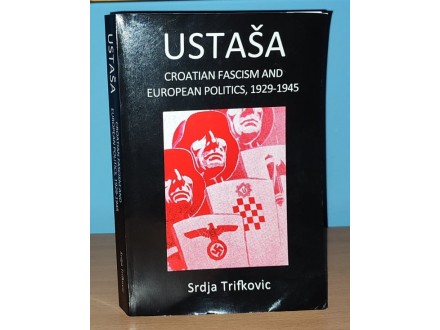USTAŠA Croatian Fascism and European Politics 1929 – 45
| Cena: |
| Želi ovaj predmet: | 5 |
| Stanje: | Polovan bez oštećenja |
| Garancija: | Ne |
| Isporuka: | Pošta Post Express Lično preuzimanje |
| Plaćanje: | Tekući račun (pre slanja) Lično |
| Grad: |
Šabac, Šabac |
ISBN: Ostalo
Godina izdanja: 2011
Autor: Domaći
Jezik: Engleski
06749) USTAŠA Croatian Fascism and European Politics 1929 – 1945 , Srdja Trifkovic ,
Publisher : Lord Byron Foundation for Balkan Studies, Chicago Ottawa London 2011
A comprehensive history of the Croatian collaborationist movement and its four years of misrule under the Axis occupation.
Every nation has a record of high crimes and misdemeanors. The Anglo-Saxon nations, which pride themselves on their civilized restraint and sense of fair play, did not exercise those virtues on the Celtic inhabitants of the British Isles, or on the native populations of North America, Africa, and Tasmania...
The Croats are in a similar position; but their crimes against Serbs, Jews, and Gypsies during the Second World War, because they are more recent, are mixed almost inextricably with the myth-making of Croatian nationalism. Nations are nourished on truth, however, and the peoples of the Balkans (and those who would presume to tell them how to live) have an urgent need of the truth that only historical scholarship can provide.
Srdja Trifkovic has written such a book, filled with passion for the truth and for giving justice to victims and to oppressors alike. His examination of the role played by European powers in the disintegration of the Kingdom of Yugoslavia and the creation of a Croatian fascist state blends a meticulous empirical method with clear and perceptive analysis. The result significantly adds to our understanding, not only of the history of southeastern Europe just before and during the Second World War, but also of the genesis of that region`s more recent crisis...
The predictable American response to the squabbles in the Balkans has been, for decades, to adopt the position of Henry Ford that `History is Bunk.` However, as Cicero observed so long ago, those who do not know what happened before they were born remain children forever. Too many Western intellectuals suffer from the sort of infantilism that led one recent American president to dismiss some unpleasant business as `just history.`
The path to sanity and maturity, both in the Balkans and in the West, must be blazed by scholars and writers who have the courage and stamina to recover the past. That is the reason why this book is so important.
From the Foreword by Thomas Fleming
Table of contents :
Foreword by Thomas Fleming
Preface
I The Legacy of Premodernity
The Military Border
The Illyrians
Starčević
The Serb Question
II The Yugoslav Experiment
The Great War
Unification
Unconsolidated Kingdom
International Environment
III An Émigré Conspiracy
Pavelić`s Early Italian Contacts
Pavelić Goes Abroad
Ustaša Principles Codified
The `Military Nucleus`
Ustašas and Fascism
IV Serbs, Croats, and the Axis
Aftermath of Marseilles
The Belgrade-Rome Axis
Hitler`s Yugoslav Policy
Maček and Italy
The Agreement Cvetković-Maček
V The Fall of Yugoslavia Precarious Neutrality
Pavelić Reactivated
German Pressure Begins
The Coup
Germans Woo Macek
The Tenth of April
VI Croatia in Hitler`s New Europe
Pavelic`s Return from Italy
Karlovac: First Signs of Axis Rivalry
A Newcomer to `New Europe`
Hitler`s Croatian Strategy
Decision on Dalmatia
The Rome Agreements
VII The Ustaša Holocaust
Pavelić at the Berghof
`Intolerance` at Work
Ustašism Unleashed
`The Last Bullet for the Last Serb`
The Role of the Catholic Church
The Ustaša and the Holocaust
VIII The Uprising
Causes and Characteristics
Italian Response
German Response
The Dangic Affair
German-Italian Discord
The Četnik Dilemma
IX Germany Takes the Initiative
German Economic Dominance
The Wehrmacht and Pavelić
The Wehrmacht Takes Command
Weiss and Schwarz
X Accomplices in Coat -Tails
Pavelić`s Foreign Ministry
Areas of Diplomatic Activity
Croatian-Hungarian Dispute
Partners in the Holocaust
XI The Turning Point
German-Partisan Contacts
The SS and the NDH
Bosnian Muslims and the SS
Effects of the Italian Armistice
Neubacher`s Mission
XII Decline and Fall
Zone of Operations Adriatic
Another Croatian Policy Review
L`Affaire Lorković-Vokić
Glaise Defeated
The Last Ally
In Search of a Miracle
XIII Conclusion
Appendixes
Sources and Bibliography
Second edition, paerback, size 15,5 x 22,5 cm , illustrated, 409 pages
CENOVNIK POŠTE SRBIJE od 6.septembra 2024. ZA PREPORUČENE TISKOVINE: :
od 101 g do 250 g 190din
od 251 g do 500 g 212 din
od 501 g do 1.000 g 225 din
od 1.001 g do 2.000 g 264 din
Predmet: 71033209










